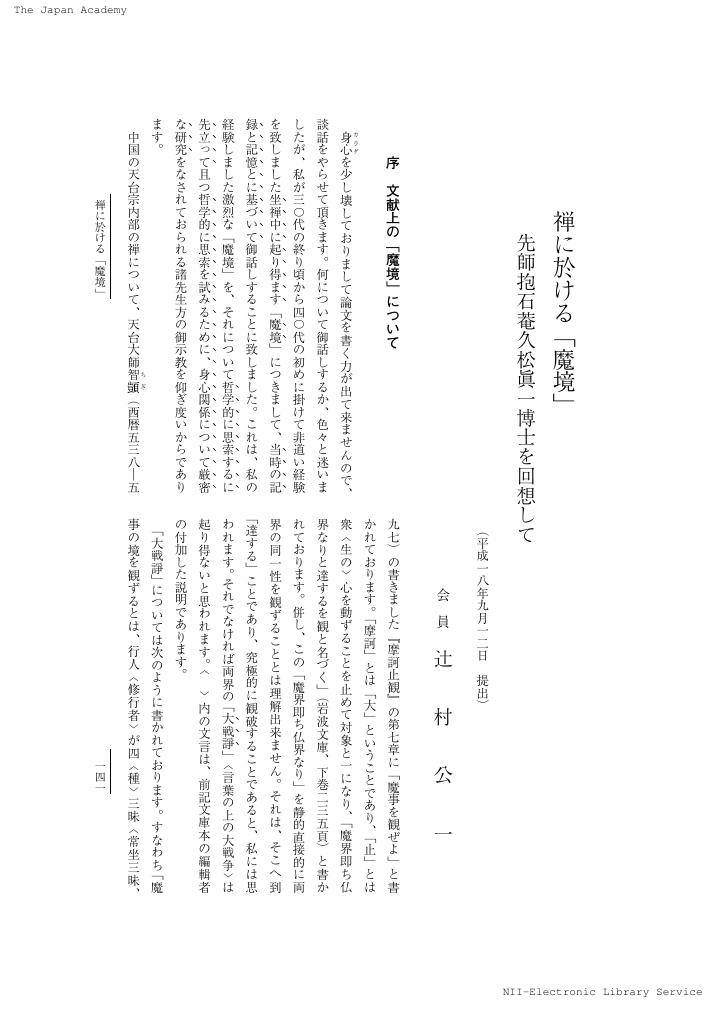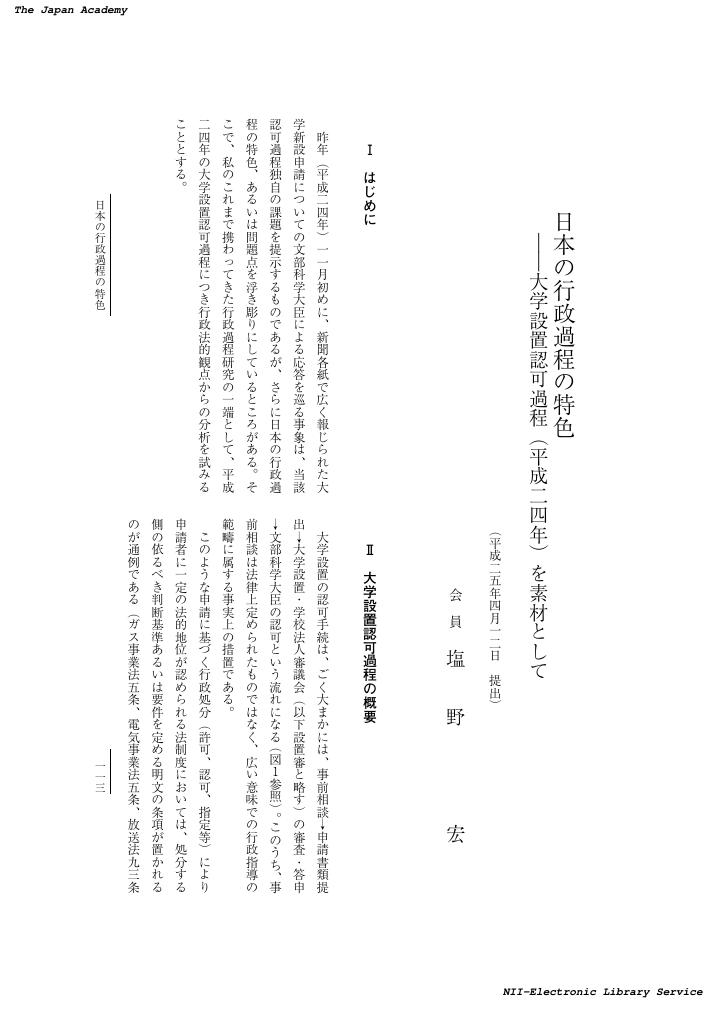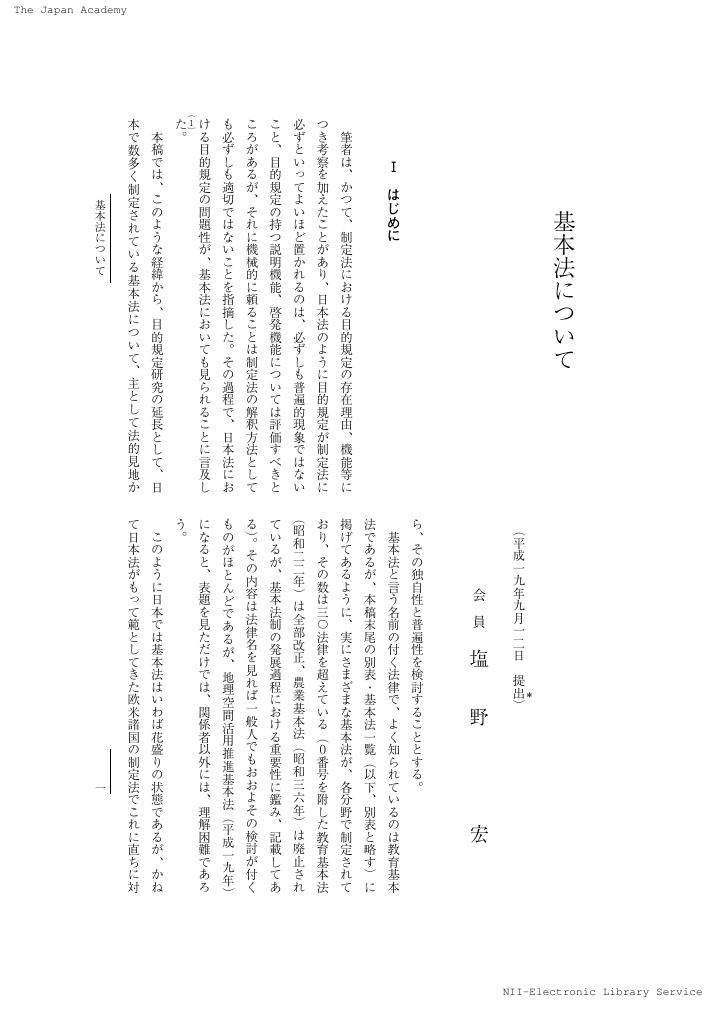5 0 0 0 OA 禅に於ける「魔境」 : 先師抱石菴久松眞一博士を回想して
- 著者
- 辻村 公一
- 出版者
- 日本学士院
- 雑誌
- 日本學士院紀要 (ISSN:03880036)
- 巻号頁・発行日
- vol.62, no.2, pp.141-171, 2007 (Released:2017-04-05)
5 0 0 0 OA 社会脳に表現された自己と他者
- 著者
- 苧阪 直行
- 出版者
- 日本学士院
- 雑誌
- 日本學士院紀要 (ISSN:03880036)
- 巻号頁・発行日
- vol.73, no.2, pp.57-81, 2019 (Released:2019-03-20)
- 参考文献数
- 56
The mental capacity of mentalizing other’s mind and self-awareness that senses self mind introspectively is a key mental ability of the social brain to understand others and to know themselves. By extracting these mental abilities with wellestablished social brain tasks, we can observe the brain’s internal representation of the self and others in the social brain region centered on medial prefrontal cortex (MPFC) by using functional magnetic resonance imaging (fMRI). In addition, it has been found that disorders in boundary formation between self and others produce accompanying various social adaptive disorders. Modeling brain imaging data by brain science of the prefrontal lobe with graph theory of informatics, connecting it widely to new developments in humanities and social sciences research, and promoting the integrated social brain science becomes critical social demands it can be said that it is in progress.
5 0 0 0 OA 「すきま」の美意識について
- 著者
- 久保田 淳
- 出版者
- 日本学士院
- 雑誌
- 日本學士院紀要 (ISSN:03880036)
- 巻号頁・発行日
- vol.73, no.3, pp.139-150, 2019 (Released:2019-04-12)
My hypothesis that there is some connection between “ma” (space or pause),which has been considered important in classical Japanese literature and arts, and “yūgen” (ethereal beauty), an often-discussed aesthetic principle thereof. To prove this hypothesis, I examined what interests the authors have in “sukima”, a form of “ma”, how effectively they express it, and what intentions they have, using waka poems, karon (poetic treatises), and monogatari (narratives) as examples. The works I cited are as follows: waka poems from the Man’yōshū, waka poems composed by poets of the Heian period, Genji monogatari (The Tale of Genji), Mumyōshō (a poetic treatise by Kamo no Chōmei), Tsurezuregusa (Essays in Idleness, a collection of essays by Yoshida Kenkō), and Kosunoto (a jiuta song of the Edo period). Furthermore, I introduced the criticisms made by Masaoka Shiki in his Utayomi ni atauru sho (Letters to a Tanka Poet), and the examples of usage of the word “yūgen” in Natsume Sōseki’s novel Kusamakura. Also, I argued that there is a connection between “yūgen” and “iki”, an aesthetic principle of early-modern Japanese literature and arts advocated by philosopher Kuki Shūzō in his book “Iki” no kōzō (The Structure of “Iki”), although the two notions appear to be quite distant from each other.
5 0 0 0 OA 『21世紀の資本』論 : 格差再拡大の政治経済学
- 著者
- 伊藤 誠
- 出版者
- 日本学士院
- 雑誌
- 日本學士院紀要 (ISSN:03880036)
- 巻号頁・発行日
- vol.70, no.1, pp.35-54, 2015-10
4 0 0 0 OA 日本の行政過程の特色--大学設置認可過程(平成24年)を素材として
- 著者
- 塩野 宏
- 出版者
- 日本学士院
- 雑誌
- 日本學士院紀要 (ISSN:03880036)
- 巻号頁・発行日
- vol.68, no.2, pp.113-137, 2014 (Released:2017-04-05)
4 0 0 0 OA 現代立憲主義における「司法」の役割
- 著者
- 佐藤 幸治
- 出版者
- 日本学士院
- 雑誌
- 日本學士院紀要 (ISSN:03880036)
- 巻号頁・発行日
- vol.73, no.2, pp.83-97, 2019 (Released:2019-03-20)
4 0 0 0 OA 近世日本の人口構造と変動
- 著者
- 速水 融
- 出版者
- 日本学士院
- 雑誌
- 日本學士院紀要 (ISSN:03880036)
- 巻号頁・発行日
- vol.62, no.3, pp.285-309, 2008-03
- 著者
- 松浦 純
- 出版者
- 日本学士院
- 雑誌
- 日本學士院紀要 (ISSN:03880036)
- 巻号頁・発行日
- vol.76, no.1, pp.21-53, 2021 (Released:2021-11-20)
Sola Scriptura, one of the “principles” of Protestantism, was first asserted clearly by Martin Luther in his Assertio omnium articulorum M. Lutheri per Bullam Leonis X. nouissimam damnatorum (1520), the reassertion of all the 41 articles collected from his writings since 1517 and condemned by the papal bull Exsurge Domine. The bull demanded that he revoke them within a set term, and menaced with excommunication, arrest and penal transport to Rome, along with his followers and protectors, in case of refusal. It was a plain act of power evoking the fire and faggot of the Bohemian reformer Jan Hus only a century earlier. As Bulla contra errores Lutheri et sequacium, however, it was at the same time an act of theological authority; from the very outset of the controversy Luther's opponents focused likewise on the issue of obedience allegedly due to the papal authority. In this context the Reformer states at the beginning: he is not ready to be compelled by the authority of a “Father however holy” unless he is approved by Scripture. — The principle that the ultimate authority for theological questions is the Holy Scripture alone, was originally asserted against the actual threatening by the papal authority and power. (View PDF for the rest of the abstract.)
4 0 0 0 OA 基本法について
4 0 0 0 OA 中国の仇討物語 ――中日劇文学の異同
- 著者
- 田仲 一成
- 出版者
- 日本学士院
- 雑誌
- 日本學士院紀要 (ISSN:03880036)
- 巻号頁・発行日
- vol.75, no.3, pp.123-141, 2021 (Released:2021-07-08)
In Chinese drama, there are few stories of revenge. But in Japanese kabuki, there are so many that, together with stories about domestic squabbles, they form a genre. This article examines the societal background giving rise to this difference. An incident of vengeance in Ming-period Zhejiang was soon turned into drama. First recorded as “Zouzhixian Xianghuji” 鄒知県湘湖記 (“An Account of What Happened in Xianghu concerning Governor Zou”), it appeared in the Ming-dynasty section of the Nanci xulu 南詞叙録 (A Description of Southern Drama) compiled by Xu Wei 徐渭 (1521–93). This “Xianghuji” has not survived intact. But three acts from the play selected for the Fengyue jinnang 風月錦嚢 (A Brocade Bag of Romantic Stories) survive in a 1553 edition of the latter preserved in the Escorial in Spain. (View PDF for the rest of the abstract.)
4 0 0 0 OA 主権独立国家の「台湾」 : 「台湾」の国際法上の地位 : (私の体験的・自伝的台湾論)
- 著者
- 小田 滋
- 出版者
- 日本学士院
- 雑誌
- 日本學士院紀要 (ISSN:03880036)
- 巻号頁・発行日
- vol.62, no.1, pp.43-68, 2007 (Released:2017-04-05)
- 被引用文献数
- 1
4 0 0 0 OA カントとニュートン
- 著者
- 永井 博
- 出版者
- The Japan Academy
- 雑誌
- 日本學士院紀要 (ISSN:03880036)
- 巻号頁・発行日
- vol.52, no.2, pp.91-99, 1997 (Released:2007-06-22)
The transcendental philosophy of Kant (1724-1804) has been considered to be one reliable justification for the classical mechanics established by Newton (1642-1727) in the 17th century. Such a viewpoint used to be accepted as common sense in learned circles. Kant was born in Königsberg and studied Newton's physics at the university of his birth place. Since that time he became devoted to the physics of Newton, and furthermore he even obtained the nick name“Newton in Königsberg”.In those days (1755) Kant anonymously published Allgemeine Naturgeschichte und Theorie des Himmels. At the beginning of this book, he said expressly that he had written it in accordance with the physical principles of Newton. Such a comment proved that he was a sincere Newtonian. Kant's earnest devotion to Newton, however, could not remain permanently, because in his old age Kant became unable to admit the term“natural philosophy, ”as used in the usual term Philosophiae naturalis principia mathematica, 1687. Using a few words in his Opus postumum Kant pointed out that Newton has fallen into the error of terminology (Kants Gesammelte Schriften, Akademie Ausgabe XXI, Opus postumum Erste Hälfte, 1936, pp. 190, 230, 510, etc.).According to Kant, using“natural philosophy”is nothing but a tautology or a contradiction. Therefore, natural philosophy must be corrected to natural “science”. Then, the concept of natural“philosophy”will disappear and the correct Principia in two different forms ought to take respectively the place of Newton's Principia as follows.X Philosophiae naturalis principia mathematica1 Scientiae naturalis principia philosophica2 Scientiae naturalis principia mathematicaHowever, was Newton's terminology of natural philosophy really erroneous? It was not necessarily the truth of the matter. The philosophy of Kant was transcendental. Accordingly philosophy should be neither defined nor qualified, although it could define all other things. From the viewpoint of transcendental philosophy it seemed to Kant that natural science must substitute for natural philosophy. Thus Kant separated philosophy from science here, and the concept of natural science came into existence. Such being the case I can not approve easily Kant's criticism of Newton's Principia. Moreover, the English had not yet the term“natural science”apart from natural philosophy. The term of natural science first appeared there in 1840. Nevertheless, Newton continued to be called“our philosopher”until later years.Since the era of ancient Greek civilization, the idea of philosophy viz. science had been a traditional expression of European thought. Kant, however, separated science from philosophy against the historical tradition in Europe. But all the pioneers of early modern science like Descartes, Kepler, Galileo, Pascal, etc. were always indeed, the philosophers. Needless to say, Newton certainly associated himself with them as well.After the separation between science and philosophy, science has unfortunately developed without philosophy and philosophy also has developed without science. But many of the results brought about expressly by scientific technology are not only undesirable, but also very confusing. An urgent question of today must be the realization of a newly constructive philosophy of science in a practical way.Philosophy without science is empty, Science without philosophy is blind.
4 0 0 0 OA 犯罪論の体系 : 構成要件論なき刑法学への道
- 著者
- 鈴木 茂嗣
- 出版者
- 日本学士院
- 雑誌
- 日本學士院紀要 (ISSN:03880036)
- 巻号頁・発行日
- vol.70, no.1, pp.19-34, 2015-10
4 0 0 0 OA 明治の国文学者
- 著者
- 久松 潜一
- 出版者
- 日本学士院
- 雑誌
- 日本學士院紀要 (ISSN:03880036)
- 巻号頁・発行日
- vol.26, no.3, pp.133-142, 1968 (Released:2007-05-30)
4 0 0 0 OA 戦前日本のアメリカ研究-素描 (平成一二年四月一二日 提出)
- 著者
- 斎藤 眞
- 出版者
- 日本学士院
- 雑誌
- 日本學士院紀要 (ISSN:03880036)
- 巻号頁・発行日
- vol.55, no.2, pp.81-103, 2000 (Released:2007-06-22)
- 被引用文献数
- 1 1
In November, 1999, celebrating the 60th anniversary of the Institute for American Studies at Rikkyo University, a special lecture meeting was held. It seems to be generally believed that American studies did not exist in pre-war Japan. But, as the establishment of that Institute at Rikkyo University itself suggests, the term“American studies”and some achievements in that field had existed well before the war. As a matter of fact, it started in the closing days of the Tokugawa regime. What was the reason for this early and strong interests in American studies in pre-war Japan?
4 0 0 0 OA 法が歴史を書く? : --最近のフランスの事例に即して--
- 著者
- 樋口 陽一
- 出版者
- 日本学士院
- 雑誌
- 日本學士院紀要 (ISSN:03880036)
- 巻号頁・発行日
- vol.62, no.2, pp.215-235, 2007-12
4 0 0 0 OA 行政法学における法人論の変遷 (平成一二年一二月一二日 提出)
- 著者
- 塩野 宏
- 出版者
- 日本学士院
- 雑誌
- 日本學士院紀要 (ISSN:03880036)
- 巻号頁・発行日
- vol.56, no.2, pp.49-64, 2002 (Released:2007-06-22)
It varies from country to country and era to era what kind of legal entities take upon public services such as supply of electricity and gas etc. and transportation of passengers and goods. At present, in Japan, the policy of leaving public services, in principle, to the market is being promoted. That is what is called privatization. However, as entities providing services in the market, in addition to the central and local governments, there exist legal entities which can be seen practically as a part of government. How to position these legal entities legally is an important task for the current scholarship on administrative organization law. This thesis analyses the historical process on the argument in the Japanese administrative law about the entities other than central and local governments, which provide public services.
3 0 0 0 OA 「買収プレミアム」と株式買取請求に係る「公正な価格」
- 著者
- 江頭 憲治郎
- 出版者
- 日本学士院
- 雑誌
- 日本學士院紀要 (ISSN:03880036)
- 巻号頁・発行日
- vol.77, no.3, pp.149-177, 2023 (Released:2023-05-12)
Ⅰ. Introduction In acquisitions of publicly traded companies, a “takeover premium” is usually paid to the shareholders of the target company, who are the sellers. If the consideration for the acquisition is cash, the acquirer makes a tender offer for the target company's shares, and the purchase price is often the market price of the target company's shares before the announcement of the acquisition plan plus an additional 30% or so, which is the takeover premium. If the consideration for the acquisition is shares issued by the acquirer (in the case of an acquisition through a merger or similar procedure), the merger ratio is often set in favor of the target company relative to the stock prices of the two companies before the announcement of the acquisition plan, which is the takeover premium. In a cash offer, the acquirer uses corporate law procedures to cash out shareholders who have not tendered their shares in the tender offer and remain in the target company, but the shareholders who are dissatisfied with the consideration delivered (which is the same amount as the purchase price in the tender offer) may petition the court to determine a “fair price” for the shares. In a merger or other acquisition in which shares are used as consideration, a shareholder who voted against the resolution approving the merger agreement may request the company to purchase his/her shares at a “fair price”. If the opposing shareholders and the company cannot reach an agreement on the purchase price, either party may petition the court to determine the purchase price. These rights are the appraisal rights. (View PDF for the rest of the abstract.)
3 0 0 0 OA 行政法における「公益」について : 公益法人制度改革を機縁として
- 著者
- 塩野 宏
- 出版者
- 日本学士院
- 雑誌
- 日本學士院紀要 (ISSN:03880036)
- 巻号頁・発行日
- vol.64, no.1, pp.25-50, 2009 (Released:2017-04-05)
3 0 0 0 OA 忘れられた歴史•地理学者北沢正誠 (昭和六十一年四月十四日 提出)
- 著者
- 岩生 成一
- 出版者
- 日本学士院
- 雑誌
- 日本學士院紀要 (ISSN:03880036)
- 巻号頁・発行日
- vol.42, no.1, pp.1-14, 1987 (Released:2007-06-22)
- 参考文献数
- 16
KITAZAWA was born to the family of a retainer of the lord Sanada of the Matsushiro fief in Shinano Province. He studied under Zozan SAKUMA in his youth and was much influenced by his teacher. After the Meiji Restoration, he obtained a position in the central government, representing the Matsushiro fief. After that, he entered the services of the Historiographical Bureau of Tokyo University, the Department of Foreign Affairs and so forth.In 1879 he made utmost efforts to establish the Tokyo Geographical Society, and since then, on the one hand he did much for its management and development, and on the other hand, devoted himself to the studies on history and geography, especially on those of Mongolia and Korea, which adjoin to China. Many papers and books, containing outstanding results of his studies concerning the said fields, were given to the public during that time.He acted as a headman of Koishikawa Ward and also as a government official of Ogasawara Islands. He was a teacher of Japanese literature and Chinese classics at Takada Middle School in his last several years and died in 1901.










